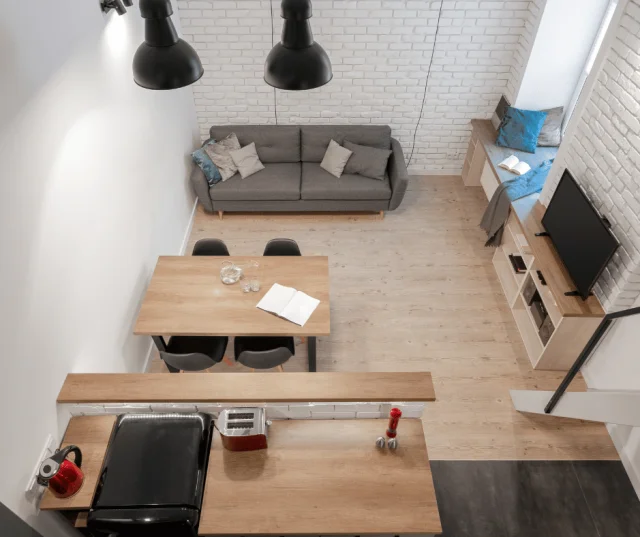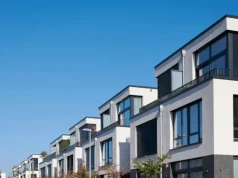What is Studio Apartment: Beginners Guide to Advance
In the world of real estate, where space often comes at a premium, studio apartments are a popular and budget-friendly housing option. Studio apartments, also known as studio flats, have become a popular housing choice. Especially among students, young professionals, and couples looking for budget-friendly options.
But what exactly is a studio apartment, and why are they gaining traction among urban dwellers? In this comprehensive blog by Propex, we uncover the mystery behind studio apartments, exploring their features, advantages, and potential drawbacks. If you’re contemplating moving to a studio apartment or simply curious our guide has everything you need to know.
Also read: what are builder floor apartments
What is a Studio Apartment?
A studio apartment is a unique living space that combines the bedroom, kitchen, and living area into a single room. Unlike traditional apartments with separate rooms, studios embrace an open floor plan, with only the bathroom being a distinct, enclosed space. Often furnished with basic amenities like a fridge, TV, bed, and power backup, these units provide privacy while accommodating a tight budget.
While the size of a studio can vary, ranging from 300 to 1,000 square feet, they are typically well-suited for solo occupants, though larger configurations may accommodate couples.
How Big is a Studio Apartment Usually?
Studio apartments can vary in size, typically 300 to 1,000 square feet. The size depends on the local property market, with larger cities often offering smaller yet more affordable studios. Despite their compact nature, studios are designed to provide a comfortable living space. Including a kitchen or kitchenette, a main living and dining area, a bed space, and a bathroom is also available.
Also read: Best areas in bangalore to live in
Types of Studio Apartments
- Regular Studio Apartment: The most common setup, featuring a single multipurpose room with an attached bathroom. It allows for flexible arrangement and personalization.
- Alcove Studio Apartment: Characterized by an L-shaped partition, it provides a secluded space for the bed and enhances privacy.
- Convertible Studio Apartment: Similar to a regular studio but spacious enough to accommodate a partition for a separate sleeping nook, offering enhanced privacy and flexibility.
Distinguishing Between Studio and 1-Bedroom Apartments
Distinguishing between a studio apartment and a 1 BHK reveals critical configuration, privacy, and cost disparities. Understanding these differences ensures an informed decision based on individual needs:
- No Walls vs. Defined Spaces: Studios have an open layout without walls, challenging occupants to define spaces creatively. In contrast, 1 BHKs offer distinct living, sleeping, and dining rooms.
- Privacy Spectrum: Studios lean towards communal living with limited privacy, suitable for individuals or couples. On the other hand, 1 BHKs provide increased seclusion, making them versatile for small families.
- Storage Dynamics: Limited space in studios prompts strategic storage solutions, while 1 BHKs often offer more built-in storage options.
- Economic Edge: Studios emerge as cost-effective alternatives, perfect for those prioritizing affordability without compromising style.
Origins of the Term “Studio Apartments”
The term “studio apartments” finds its roots in combining living and workspace for professionals, such as artists, photographers, and designers. The idea was to create a versatile living space that maximizes utility by minimizing dividing walls.
Living in a Studio Apartment: Pros and Cons
Advantages of Living in a Studio Apartment:
- Affordability: Studio apartments present an economical avenue for stylish living within budget constraints.
- Ease of Maintenance: With a singular room to manage, cleaning becomes a streamlined process, promoting a hassle-free lifestyle.
- Resource Efficiency: Studios consume less electricity and water, contributing to a greener and more sustainable urban lifestyle.
- Central Location: Typically situated in prime urban locations, studios offer convenient connectivity to various city areas.
Disadvantages of Living in a Studio Apartment:
- Lack of Storage: Limited space may pose a challenge for those with extensive belongings.
- Not Ideal for Couples: Couples might find the lack of a dedicated bedroom less appealing compared to 1-bedroom apartments.
- Potential for Isolation: Living alone in a studio can lead to feelings of isolation, impacting the social aspect of home life.
Setting Up Your Studio Apartment
1. Create Storage Underneath Your Bed and Sofa
Maximize the potential of your studio’s square footage by utilizing the often-overlooked space beneath your bed and sofa. Invest in slimline storage boxes or drawers on wheels, specifically designed for seamless integration under furniture. This strategic approach accommodates seasonal clothing and provides a discreet spot for daily essentials like shoes, ensuring a clutter-free living space.
2. Shop for Furniture That Doubles as Storage
Strategic furniture choices are pivotal in small studio apartments. Opt for furniture that moonlights as storage, combining utility with aesthetic appeal. Coffee tables with lift-up tops and benches with concealed compartments offer practical solutions.
This allows you to maintain a sleek look while discreetly stashing away belongings.
3. Choose Convertible Furniture
Embrace convertible pieces that adapt to your needs, from kitchen islands on wheels to nesting tables. These transformative elements provide versatility without compromising on style. A drop-down table in the kitchen or stackable end tables in the living area exemplifies the art of optimizing space while retaining functionality.
4. Divide and Conquer With Multi-Tasking Room Dividers
Improve the functionality of your studio by introducing multi-tasking room dividers. Beyond their traditional role, these dividers can offer additional storage, such as elegant etageres. By incorporating open-backed shelving units, you delineate distinct areas within your studio and gain valuable storage space for decor, books, or essentials.
5. Try Vertical Bookshelves
For avid readers, vertical bookshelves are a game-changer. The towering stacks of books serve a functional purpose and introduce a unique aesthetic to your studio.
6. Upgrade Your Storage Box Situation
Storage boxes need not be relegated to closets. Opt for aesthetically pleasing boxes that deserve to be showcased. Introduce vibrant colours, diverse shapes, and patterns to transform storage into a decorative element.
Consider using attractive baskets for visible storage, seamlessly blending organization with interior design.
7. Arrange Clothing and Accessories as Wall Decor
Install rows of hooks for necklaces, scarves, and hats, transforming your collection into a visually striking display. A coat rack can serve as both a practical storage solution and a decorative element, merging style with functionality.
Is It Worth Living in a Studio Apartment?
Studio apartments resonate with individuals and couples seeking sophistication without compromise. They are ideal for:
- Students or working professionals crave proximity to educational institutions or offices.
- Couples desiring a cosy yet affordable living space.
- First-time home buyers are navigating budget constraints without sacrificing style.
Living in a studio apartment can be a worthwhile choice for singles or couples comfortable in close quarters. The cost-effectiveness, flexibility, and smaller environmental footprint make studios compelling for those looking to save money or embrace a minimalist lifestyle.
Conclusion
Studio apartments offer a unique and practical living experience, balancing affordability with functionality. Understanding the advantages and disadvantages and recognizing their distinct features can help individuals make informed decisions when considering this housing option. Whether you’re drawn to their affordability, easy maintenance, or flexible living arrangements, understanding the nuances of studio living is crucial.
As the real estate market diversifies, studio apartments remain a viable and attractive option for those embracing a minimalist and cost-effective lifestyle.





